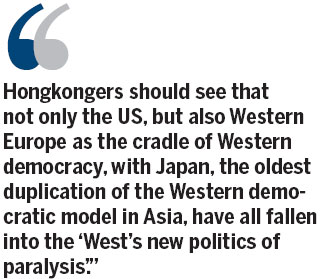Hong Kong's political paralysis
Updated: 2013-10-03 07:30
By Zhou Bajun(HK Edition)
|
|||||||
Clifford Hart, the US consul-general in Hong Kong and Macao, gave his maiden luncheon speech to Hong Kong's American Chamber of Commerce on Sept 24. Referring to the city's politics, Hart said: "I have been deeply encouraged by my meetings across Hong Kong's rich political spectrum. Every leader I have met cares passionately about the SAR, supports democracy, and recognizes that the region's future is inextricably linked to the rest of China's. Differences on detail are inevitable in any polity of seven million human beings. It is clear to me, however, that broad political labels such as 'pro-democracy' and 'pro-Beijing' fail to capture the nuances of Hong Kong's reality. I have yet personally to meet anybody who is anti-democratic or anti-Chinese. I am confident that strong common goals, the creative practicality of the Hong Kong people, and the mutual forbearance that is a hallmark of Chinese culture will inform the complex discussions and final decisions on universal suffrage."
So lovely a rosy political landscape it is! However, it isn't the territory's reality. What Hart depicts is his dream; accurately, it is Hart's fiction of Hong Kong with malicious intention.
Actually, the fundamental political contradiction in Hong Kong has intensified. The struggle between the patriot camp and the opposition camp is entering the decisive stage. Faced with the "Occupy Central" campaign, Hong Kong is at stake.
Benny Tai Yiu-ting, the initiator of "Occupy", has emphasized that the campaign is like a "nuclear bomb" in order to threaten the central government. If Beijing doesn't allow the "pan-democracy" camp to have "genuine" universal suffrage in 2017, the latter will ignite the "nuclear bomb", destroying Hong Kong as an international financial center and the city's economy. Though it isn't a real nuclear bomb so its explosion wouldn't cause any material damage to the US Consulate-General in Central, its economic consequences for American business will be as terrible as to other nationalities' business in the same area.
In the past decades, the opposition camp repeated political demonstrations shouting anti-China and anti-Beijing slogans at least twice per year. The majority of citizens including non-permanent residents comprehend that the political strait here in Hong Kong is deep and wide. Foreign bosses are behind the "pan-democracy" camp, and to this extent, it is reasonable for Hart to have said that the "political labels such as 'pro-democracy' and 'pro-Beijing' fail to capture the nuances of Hong Kong's reality."

Nevertheless, Hart intentionally neglects Hong Kong's political division. The rational judgment is that he represents the US willing to introduce the Western political model into the Hong Kong SAR. Even Hart recognizes that, "democracy adapts itself across societies" and that the US "does not take a position for or against any particular electoral formulation on how genuine universal suffrage is achieved", he stressed: "As the world's oldest constitutional democracy, we will always advocate the fundamental principles that underlie every successful democracy - open dialogue and debate; a strong and independent free press; an independent judiciary; the rule of law; free and fair elections; and choice among candidates." In short, Hart is selling a multiparty regime and the bipartisan system in particular.
As an experienced politician, the US consul-general is aware of the fundamental nature of a multiparty regime - political parties, large or small, all upholding common core values, dedicated to and defending national core interests. Allied to this basic concept, it is easy to understand Hart subjectively wiping out Hong Kong's political division.
Hart's fiction is easily pierced, but, it is attractive to Hongkongers who believe in the politics of the West. Hongkongers should see that not only the US, but also Western Europe as the cradle of Western democracy, with Japan, the oldest duplication of the Western democratic model in Asia, have all fallen into the "West's new politics of paralysis".
The US Congress is dysfunctional. The Republicans and the Democrats ceaselessly wrestle at the brink of the "fiscal cliff". Many Americans feel anxious - the US is failing.
The West's democracy, based on common core values and national core interest, is in crisis. Can Hong Kong smoothly approach universal suffrage with profound political division?
The author is a veteran current affairs commentator.
(HK Edition 10/03/2013 page5)